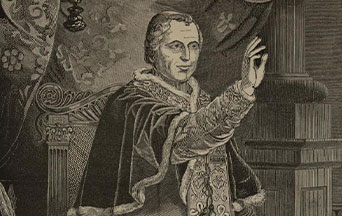
Two great misfortunes marked Louis Veuillot’s life during Felix Dupanloup’s, the Bishop of Orleans, campaign to get the French episcopate to condemn L’Univers. First, Veuillot’s six-month old daughter, Thérèse passed away in July 1852. In November, his wife died of peritonitis shortly after giving birth to their daughter Medeline. Grief-stricken, the editor-in-chief of l’Univers decided to go to Rome and seek consolation for such hard blows from the common Father of the faithful.
Under the weight of such great afflictions, the editor could not foresee the consequences of his struggle against the Bishop. After responding to Abbé Gaduel’s criticism of Juan Donoso Cortés’s book, Essays on Catholicism, Liberalism, and Socialism, Veuillot left for the Eternal City. At an audience with Pius IX, the Holy Father encouraged him to continue his work and permitted him to attend the next day’s papal mass. Soon after receiving communion from the hands of the Sovereign Pontiff, Veuillot learned of the archbishop of Paris’ condemnation of his newspaper, which we discussed in the last article. So, his trip to Rome was providential.
Eternal and Natural Law: The Foundation of Morals and Law
Despite Veuillot’s renown, the matter was quite serious. However many Roman circles were still unaware of its details. When Pius IX’s secretary, Cardinal Fioramonti, who normally read no newspapers, received l’Univers’ appeal against the archbishop’s decision, he inquired about Veuillot. The Cardinal started by asking whether Veuillot was a Catholic. After carefully investigating, Fioramonti became one of the paper’s staunchest defenders. As we related in the previous article, everyone interpreted the Cardinal’s letter of approval for Veuillot as signifying the pope’s disapproval of Archbishop Marie-Dominique-Auguste Sibour of Paris.
Despite all the episcopate’s manifestations in favor of l’Univers and Msgr. Fioramonti’s letter, Bishop Sibour remained determined to use every means to maintain his condemnation. Bishop Dupanloup was also preparing an ecclesiastical order against the newspaper. Other bishops, such as those of Viriers and Marseilles, supported the act of the Archbishop of Paris.
At that point, a pilgrimage of priests from the Diocese of Marseilles visited Pius IX. The Pope charged them to tell their bishop that he was unhappy with the Bishop’s stance against l’Univers. He added that, far from criticizing the editors of that paper, he saw them as most devoted defenders of the Holy See. In the meantime, the Apostolic Nuncio in Paris was trying to dissuade the Archbishop while looking for a formula whereby the Archbishop could suspend his condemnation without looking weak in the eyes of the public.
Finally, Pius IX told Veuillot that he should ask the archbishop to suspend the penalty pro bono pacis [for the sake of peace]. Veuillot obeyed without reluctance but addressed a plea to the Sovereign Pontiff.
“I have written the enclosed letter in obedience to Your Holiness’ wishes. I beg Your Holiness to remember that the archbishop of Paris, to whom I address this request, has punished me unjustly, and the sentence with which he struck me, even when I was at your feet, still weighs upon my freedom and honor.
 Learn All About the Prophecies of Our Lady of Good Success About Our Times
Learn All About the Prophecies of Our Lady of Good Success About Our Times
“From Your Holiness’ very humble and submissive son, Louis Veuillot.”
The encyclical Inter Multiplices (Among the Many) was published in Rome a few days later. In it, the Holy Father dealt with several issues agitating France. He specifically asked bishops to favor Catholic newspapers.
“At the same time encourage with all benevolence and favor those men who, animated by a Catholic spirit and educated in literature and learning, will endeavor to write books and publish magazines.”
As soon as he learned of the encyclical, Archbishop Sibour issued a statement.
“We, Marie-Dominique-Auguste Sibour, by divine mercy and the grace of the Holy Apostolic See, Archbishop of Paris,
“Having learned of the encyclical letter dated March 21, 1853, which our Holy Father Pope Pius IX addressed to the cardinals, archbishops and bishops of France;
“Seeking to put into practice the advice contained therein and to fulfill the intentions of the Head of the Church without reservation;
10 Razones Por las Cuales el “Matrimonio” Homosexual es Dañino y tiene que Ser Desaprobado
“Wishing to contribute to appease the arguments that have arisen in recent times and to gladden the heart of the Sovereign Pontiff:
“We spontaneously lift the prohibitions of our commandment of February 17, 1853.”
When the encyclical was made public, Bishop Dupanloup’s order was being printed. He suspended its publication. Consternation reigned in circles hostile to l’Univers. Father Henri Maret, who was a director of the liberal Catholic newspaper, Ère Nouvelle, wrote Frederic Ozanam, the paper’s editor, “I am sad and desolate beyond all expression.”
The editorial staff of l’Univers went on a thanksgiving pilgrimage to the Church of Our Lady of Victories. Archbishop Parisis of Arras wrote Veuillot, “What a wonderful encyclical, and what a magnificent consolation for l’Univers to have been its object!”
In the following years, no bishop ever took any action against l’Univers. In the words of Archbishop Parisis, it had become “a great Catholic institution.”

